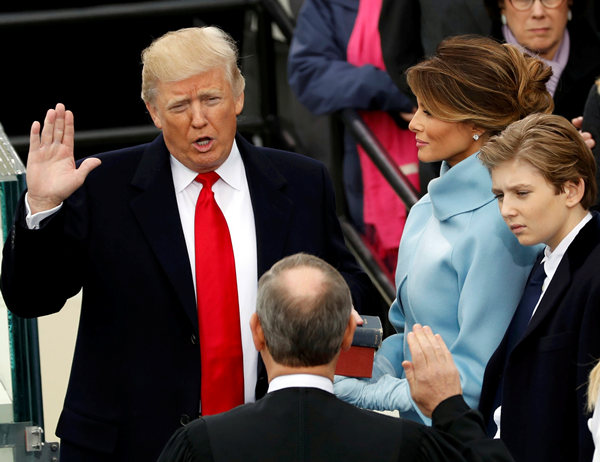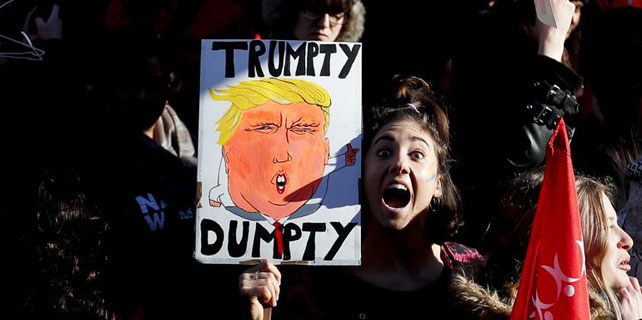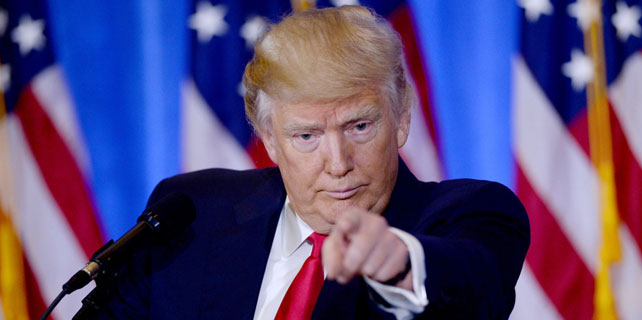One-China policy is nonnegotiable
 |
|
US President Donald Trump takes the oath of office with his wife Melania and son Barron at his side, during his inauguration at the US Capitol in Washington, US, January 20, 2017. [Photo/Agencies] |
President Donald Trump was sworn into power on Friday, assuming a tremendous amount of responsibility for the welfare and security of Americans. And as the United States is the world's sole superpower and highly interdependent with the rest of the world, Trump also shoulders great responsibility for global peace and development.
As he did on the campaign trail, Trump declared in his inauguration speech that he was going to put "America First". It is not hard to understand why the US president would like to "make America great again", but as his first work after being sworn into office was to suspend Obamacare, his disruptive, if not destructive, style has already divided the country.
He also seems intent on dividing the world, possibly plunging China-US relations into chaos. Despite certain turbulences in the past years, China and the US have largely experienced a stable and sustainable relationship during the Obama presidency. Actually this has been the trend since the two countries normalized their relations. Beijing and Washington do compete in many areas, but they also cooperate in many areas. Their relations are based on the shared consensus that Taiwan is part of one China, which has been affirmed by every US administration since 1979. On this basis, China and the US have partnered on various issues, in particular on nuclear proliferation and anti-terrorism, and notably climate change.
However, Trump and his team conducted a rather controversial campaign on their march toward the White House. While he has vowed to raise the status of the US, he has shown great disrespect toward various groups of Americans. And in terms of foreign relations, while he wants "fair" trade through negotiations with others, especially China, he has attempted to gain an advantage, by threatening to disregard the one-China policy.
Trump is known to seek the maximum concessions from the other party when making a deal, and he may have succeeded with this approach as a businessman. However, he needs to understand that as a statesman he is playing for much higher stakes, especially when it comes to another country's core interests.
The best way for the two countries to handle their trade differences is through negotiation. And if, as he says, Trump is willing to settle disputes through negotiation, then he should realize that he needs to give as well as take. For instance on trade, while the American Chamber of Commerce in China says its members are complaining about an "unfavorable" investment environment in China, Chinese businesspeople are also complaining of the US' rising protectionism which is hurting them.
Luckily, at a time of globalization, both China and the US are members of the World Trade Organization. Despite Trump announcing he is withdrawing the US from the Trans-Pacific Partnership agreement and he is threatening to quit the North American Free Trade Agreement unless it is renegotiated, it is unlikely that he will let America exit the WTO. So both Beijing and Washington can ask the Geneva-based body to settle their trade disputes. Should the Trump administration resort to a trade war, China is likely to respond by being equally unpleasant.
If Trump chooses to raise the stakes even higher by using Taiwan as a bargaining chip, then he may step into a territory that he is unfamiliar with. China has made it clear that the one-China policy is nonnegotiable. Playing with fire will not make the US great again.
Trump's pick for Secretary of State Rex Tillerson has stated that his position is there is no intent to change the principle of one China. The Trump administration should reaffirm it unambiguously as the official US policy.
The author is a professor and associate dean of the Institute of International Studies at Fudan University.






















